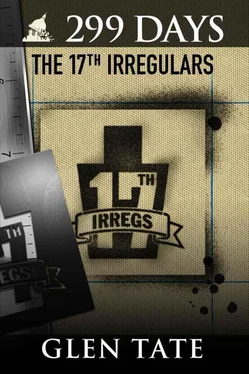But not everyone was adjusting to the “new normal” as people called it. Some people dealt with the changes by complaining. They would whine that the mail didn’t come that day; it hadn’t come in three months. They would complain that nothing was on TV, or that the internet was down again that day. For these people, every little thing about their old lives that was no longer present was a topic to complain about. Most people were initially patient with the whines, but soon they started telling people to shut up.
For a few others, they were coping with the changes with some very odd behavior. One man brought old, pre-Collapse newspapers into the Grange and read them all day. Over and over again. He couldn’t get enough of stories about how life used to be. A woman went from house to house asking people if they had old calendars from the year before. She would look at the old calendars all day and mark the past dates with little notes about what she had been doing back then, when things were normal.
Grant noticed that now, almost three months into the Collapse, something great was happening: boredom. After the initial shock of the Collapse started wearing off, people were getting a little bored. Good boredom, as in no one was trying to kill them today and they had the same meal again, but at least they’d had a meal.
Grant was amazed by the human spirit and resilience so many of them demonstrated after being faced with disorder and an unknown future. Human beings are amazing. In just a few short months most Pierce Point residents had gone from the chaos of the end of the world to a new same ole’, same ole’.
Chapter 195
Marion Farm Kicks Ass
(July 18)
Ted and Sap hadn’t been out to Pierce Point for a week or two. They were getting things together at HQ and would check in periodically on the special radio they left with Scotty. One day, Scotty got the radio message that Ted and Sap would be coming out that night for a meeting and update. The Team kicked out their girlfriends and got down to business. Rich and Dan came out to the yellow cabin for the meeting.
The first thing Grant noticed about Ted and Sap was that their beards were even longer than before. That was true of most men, including Grant. Beards were the “new normal.”
“Well, gentlemen,” Ted said, “we’ll be locating out at the Marion Farm soon.”
“When do we go out there?” Ryan asked. Grant was dreading this. The day they went out to Marion Farm would be when he would have to tell Lisa what was going on.
“Oh, permanently?” Ted asked. “Not until right before we need to deploy. No, we’ll have you guys coming out on day trips and occasional night training exercises in the meantime. We’ll keep you at your day jobs here as much as possible. That’s part of the deal with Rich and Dan: as low impact on the internal security of Pierce Point as possible.”
“Besides,” Sap said, “you guys are well trained. We don’t need to show you how to shoot. We’ll have you come in during the days and provide instruction. We’ll teach you guys some basic military things, like how to move as a larger unit. That kind of thing. But it’s all finishing-touch stuff for you guys.”
“That’s not because we’re military bad asses,” Grant said, “but because the level of training for an irregular unit is relatively low?” Grant didn’t want the Team thinking they already knew everything so they wouldn’t pay attention to the further training.
Ted shrugged and said, “Yeah. Kinda. You guys are very good, but there are still some things you need to know.” Ted, too, wanted to keep up the Team’s confidence, but gently let them know that there were still things they needed to learn.
“Before we get into the details of the training program,” Ted said, “we have some intel to give you.” Ted went on to describe how the Loyalists were crumbling. He gave updated examples of military units “sitting out” the war or joining the Patriots. Many cops were joining up with Patriot units or running pro-Patriot para operations. Montana had kicked out every federal official and sympathizer, and captured a huge military ammunition depot in the process. New Hampshire, surrounded by Lima Northeastern states like it was, was largely in Patriot hands. The Patriots had even managed to shoot up several key buildings in Chicago. A small team of former SEALs came in from Lake Michigan and swam up the Chicago River. The raid had no military significance, except that it caused the Limas to pour even more resources into defending Chicago, but it sure had a psychological effect.
Seattle was a functioning city, but it was teetering on the edge of lawlessness. There was so much money and so many people with government connections in the city that important people lived a luxurious life. What was left of the authorities—and the gangs cooperating with them—were maintaining order. But resentment was running high. Even the most strident Loyalists in Seattle were figuring out that this wasn’t working well.
Olympia was the other Lima stronghold in the state. It was Seattle on a smaller scale: important people living pretty well, but resentment among the regular people was growing. They were maintaining order but only with increasingly extreme measures.
“Are people starving?” Chip asked. He had lots of friends still stuck in Olympia and wanted to know how they were doing.
“Surprisingly, no,” Ted said. “People are hungry, and some are really hungry, but those semis keep rolling in with basic foods. They come in under heavy escort, but they’re rolling. The giant corporate farms are churning out lots of food. Well, with slave labor pretty much. The Mexicans who were trapped up here or fled up here are working the farms. Pretty brutal conditions, but they’re better off than going back home. Mexico is a giant killing field right now.” It was silent.
Finally Ted said, “The Limas are sending prisoners to the farms to work. The conditions are bad, but it’s not like a concentration camp or anything. Hell, some people are volunteering to work on the farms because they get fed and there are fewer security issues out there. It sounds kinda like how my Okie grandpa lived,” Ted said, using the term referring to people from Oklahoma. “My grandpa and his parents lived as migrant farmers during the Depression. You know, Grapes of Wrath,” he said referring to the John Steinbeck novel about people from Oklahoma who went to southern California during the 1930s to find work.
“The forces still loyal to the government are pathetic,” Ted continued. “There are some loyal ground units—mostly Army and National Guard—run by ladder-climbing young officers who want to get promoted. There are tons of career opportunities for a young lieutenant when there are so many openings, like when the battalion commander is gone.” He described how some military units were operating like gangs. “Not full-time,” he added, “some of these units are soldiers for a few weeks and then, if an opportunity presents itself, they are a gang for a while, then they might go back to being soldiers. They’re gangs of opportunity.”
“Anyway,” Ted continued with a smile, “it’s pretty obvious the Limas are going to fully collapse. Soon. Very soon. It’s our job to speed that process along, which brings me to my next bit of news.” The room was spellbound.
“Marion Farm kicks ass,” Ted said. Sap nodded. “We’ve been out there and fully assessed the place. It’s perfect. Secluded. Beach access for supplies. Plenty of room. A farmhouse HQ, a couple of outbuildings and a big barn for sleeping a lot of men.”
“How many?” Bobby asked.
“A hundred,” Ted said. “That’s with some pretty cozy bunking arrangements, but nothing a soldier can’t handle.” They let that sink in with the Team: a hundred-man unit. Wow. Much bigger than anything they’d thought of out there. A real military unit instead of what the Team had been: some civilians acting as semi-sophisticated law enforcement.
Читать дальше











